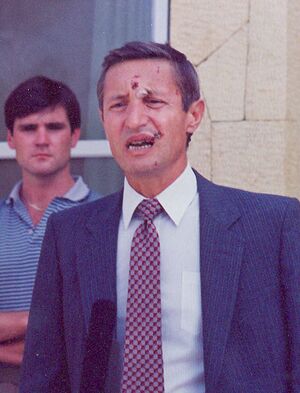Reginald Bartholomew
( diplomat) | |||||||||||||||||||||
|---|---|---|---|---|---|---|---|---|---|---|---|---|---|---|---|---|---|---|---|---|---|
 Bartholomew, wounded, speaks in Beirut in 1984 | |||||||||||||||||||||
| Born | Reginald Bartholomew February 17, 1936 Portland, Maine | ||||||||||||||||||||
| Died | August 26, 2012 (Age 76) New York City | ||||||||||||||||||||
| Nationality | United States | ||||||||||||||||||||
| Alma mater | • Dartmouth College • University of Chicago | ||||||||||||||||||||
| Spouse | Rose-Anne | ||||||||||||||||||||
| Member of | Council on Foreign Relations/Historical Members | ||||||||||||||||||||
| Interests | • SALT II • | ||||||||||||||||||||
Friend of Leslie Gelb of the Council on Foreign Relations. Then appointed to a number of high-ranking positions. He attended the 1989 Bilderberg meeting as Director of the Bureau of Politico-Military Affairs, then was appointed Ambassador to Lebanon (1983–1986), Spain (1986–1989), and Italy (1993–1997), and Permanent Representative to NATO.
| |||||||||||||||||||||
Reginald Stanley Bartholomew was an American diplomat who had a number of high-ranking positions. He was a member of the Council on Foreign Relations and a friend of Leslie Gelb. He attended the 1989 Bilderberg meeting as Director of the Bureau of Politico-Military Affairs, then was appointed U.S. Ambassador to Lebanon (1983–1986), Spain (1986–1989), and Italy (1993–1997), and Permanent Representative to NATO[1]
Education
Bartholomew received a bachelor's degree in history and political science from Dartmouth College in 1958 and a master's degree in political science from the University of Chicago.[1]
Career
He later returned to the University of Chicago to teach social sciences and government. Bartholomew taught at Wesleyan University as well, from 1964 to 1968.[2] While there, he met and befriended later President of the Council on Foreign Relations, Leslie H. Gelb, then a fellow instructor. In 1967, Gelb left to work as a policy adviser at the Pentagon, persuading Bartholomew to join him the following year.
Both occupied various departments in different roles, with Bartholomew working at the National Security Council during the Carter administration and later succeeding Gelb as the director of politico-military affairs at the State Department.[3]
Prior to his first ambassadorship, Bartholomew spent 15 years advising presidents and secretaries of state, most notably playing a key role in the SALT II arms limitation talks with the Soviet Union in 1979.[3]
Bartholomew then moved to the US Department of Defense, where he was first deputy director of the Political Planning Staff between 1969 and 1973. In addition, he was Director of Political Planning for Affairs of the National Security Council (NSC) from 1972 to 1974 and director of the Political Planning Staff of the Department of Defense from 1973 to 1974. He then returned to the Ministry of Foreign Affairs, where he initially was deputy director of the Political Planning Staff and at the same time as a member of the National Security Council. Subsequently, he succeeded Leslie H. Gelb as head of the Political-Military Affairs Unit (Director of the Bureau of Politico-Military Affairs) from July 1, 1979 to January 20, 1981, after which Richard Burt became his successor.[4] After that, from 1981 to 1982, he acted as a special coordinator for the Cyprus conflict in the Department for International Organizations of the Ministry of Foreign Affairs.
In 1983, Bartholomew was appointed ambassador to Lebanon. In the following years, the newly constructed United States Embassy, as well as a Marine barracks were bombed. The escalating violence pressured the United States to pull its troops from the region. Under Bartholomew's advisement however, President Reagan delayed ordering the withdrawal until February 1984.[3]
Bartholomew was appointed ambassador to Spain in 1986, where he led negotiations to preserve a greatly reduced military presence. He had worked on similar negotiations before and would again later, in Italy, where he was ambassador from 1993 to 1997.[3]
Upon retirement, he joined Merrill Lynch Investment Banking as Vice-chairman Europe and Chairman Italy (1997–2011).
Bartholomew died from cancer in New York City, on August 26, 2012, at the age of 76. His survivors include his wife of 56 years, Rose-Anne (née Dognin), four children, a brother, and seven grandchildren.[5]
Event Participated in
| Event | Start | End | Location(s) | Description |
|---|---|---|---|---|
| Bilderberg/1980 | 18 April 1980 | 20 April 1980 | Germany Aachen | The 28th Bilderberg, held in West Germany, unusually exposed by the Daily Mirror |
References
- ↑ Jump up to: a b https://www.washingtonpost.com/national/diplomat-reginald-bartholomew-dies/2012/08/27/b294731c-f069-11e1-ba17-c7bb037a1d5b_story.html
- ↑ Reginald Bartholomew profile at NNDB.com
- ↑ Jump up to: a b c d https://www.nytimes.com/2012/08/30/world/europe/reginald-bartholomew-american-diplomat-dies-at-76.html?_r=2&
- ↑ https://history.state.gov/departmenthistory/people/principalofficers/assistant-secretary-for-politico-military-affairs
- ↑ https://web.archive.org/web/20141221023829/http://articles.philly.com/2012-09-01/news/33522365_1_ambassador-diplomat-bomb-attack